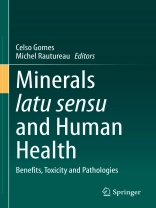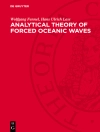This volume provides a comprehensive academic review of both positive and negative effects of minerals on human health and quality of life. The book adopts the concept of mineral latu sensu (mineral l.s.), which encompasses a broad spectrum of natural, inorganic, solid, and crystalline, of natural and inorganic chemical elements (metals and metalloids), of modified natural minerals, of biominerals, and of syntetic minerals, all products that branch across the disciplines of earth, soil, environmental, materials, nutrition, and health sciences. Using this broad framework, the authors are able to provide a multidisciplinary assessment on many types of minerals which can be essential, beneficial and hazardous to human health, covering applications in medical geology, medical hydrology or balneotherapy, pharmacology, chemistry, nutrition, and biophysics. The book performs historical analyses of the uses of minerals for therapeutic and cosmetic purposes to better understand current trends and developments in mineral research and human health. The book will be of interest to students, public health officials, environmental agencies and researchers from various disciplines, as well as scientific societies and organizations focusing on medical geology, health resort medicine (crenotherapy, hydrotherapy and climatotherapy), and on pharmaceutical, cosmetic and biomedical applications.
Tabella dei contenuti
Chapter1. Introduction, Targets and Concepts.- Chapter2. Minerals, Natural Environment and Medical Geology.- Chapter3. Historical Evolution of the Use of Minerals in the Human Health.- Chapter4. Health Benefits and Risks of Minerals, Bioavailability, Bio-essentiality, Toxicity, and Pathologies.- Chapter5. Metals, Life and Health.- Chapter6. General Data on Clay Science, Crystallochemistry and Systematics of Clay Minerals, and Clay Typologies, Properties and Applications.- Chapter7. Interactions of Clay and Clay Minerals in the Human Health.- Chapter8. Minerals and the Origins of Life.- Chapter9. Minerals Utilized in Pharmacy and Cosmetics.- Chapter10. Nanominerals and Nanomaterials Utilized in Pharmacy and Therapeutics.- Chapter11. Biominerals and Biomaterials.- Chapter12. Psammotherapy or Arenotherapy.- Chatper13. Mineral Water: Essential to Life, Health and Wellness.- Chapter14. Natural Mineral Water Used in Health Resort Medicine.- Chapter15. Healing Sulfurous Thermal Waters Used in Health Resort Medicine: Therapies, Indications and Contraindications.- Chatper16. Natural Salt Mineral Water and Thalassotherapy.
Circa l’autore
Dr. Celso de Sousa Figueiredo Gomes (retired) is a former Professor Cathedratico at University d’Aveiro, Portugal. He was Assistant Professor (1961 – 1967) at the Mineralogical and Geological Museum of the University of Coimbra, teaching Crystallography, Mineralogy, Petrology, and Geology, and he was Chief-Geologist of the Geological Survey of Angola and Assistant Professor at the University of Luanda, Angola (1968 – 1974). In 1964 he began his study of Soil and Clay Sciences at the Instituto de Edafologia e Agrobiologia Vegetal of the Consejo Superior de Investigacion Científica (Madrid), and continued in Aberdeen, Scotland, at the Macaulay Institute for Soil Research. In 1979 he received a Ph D in Materials Science from the Leeds University, United Kingdom. He is the author and co-author of over 500 scientific papers, and the author and co-author of 21 books and 5 chapters of scientific books. He has organized various National and International Conferences.
Since his retirement (2003) Dr. Gomes is a researcher of the Research Centre “Geo Bio Tec” financed by the Portuguese Foundation for Science and Technology of the Ministry of Science, Technology and Higher Education. Dr. Gomes presently is member of the following scientific societies: AIPEA (Association Internationale Pour L’Étude des Argiles), Mineralogical Society (United Kingdom), Clays and Clay Minerals Society (United States of America), Sociedad Española de Arcillas (Spain), Clay Science Society (Japan), Sociedade Portuguesa de Cerâmica e Vidro, Sociedade Portuguesa de Hidrologia Médica, and Global Scientific and Advisory Council of the World Health and Wellness Tourism Association (WHWTA). In 1995 he founded APA (Associação Portuguesa de Argilas), an affiliate of ECGA (European Clay Groups Association) and AIPEA, being the President of ECGA (2007 – 2011).
Dr. Michel Rautureau (retired) began working in 1958 at the French National Centre for Scientific Research’s “laboratoire desynthèse atomique et d’optique protonique” a facility dedicated to electron microscopy of clay minerals and cell biology. He worked under the direction of Professor Claude Magnan, author of the famous “Traité de microscopie électronique”. Dr. Rautureau received his Ph D in 1972; his theses work on the crystalline structure of sepiolite, a fibrous clay mineral, and was soon recognized as an authority on clay minerals. He, with Simonne Caillère and Stéphane Hénin authored “Minéralogie des Argiles” a major reference in the subject of the mineralogy of clay minerals and the first book to present their global classification. Dr. Rautureau is a member of Groupe Français des argiles (GFA), Association Internationale Pour L’ Étude des Argiles (AIPEA), French society of electron microscopy, French society of Mineralogy, French society of geology, Sociéte botanique de France, Association Française pour l’avancement des Sciences (AFAS), and a member of the administrative council for Section Française de l’Institut International de la Conservation (SFIIC).












